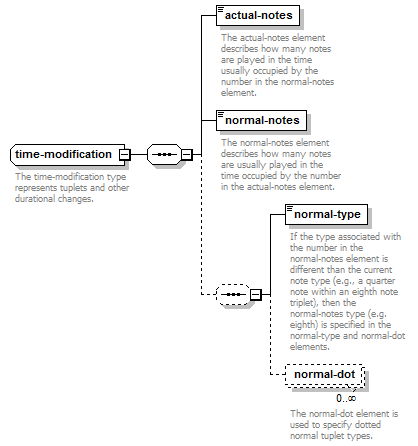<xs:complexType name="time-modification">
<xs:annotation>
<xs:documentation>The time-modification type represents tuplets and other durational changes.</xs:documentation>
</xs:annotation>
<xs:sequence>
<xs:element name="actual-notes" type="xs:nonNegativeInteger">
<xs:annotation>
<xs:documentation>The actual-notes element describes how many notes are played in the time usually occupied by the number in the normal-notes element.</xs:documentation>
</xs:annotation>
</xs:element>
<xs:element name="normal-notes" type="xs:nonNegativeInteger">
<xs:annotation>
<xs:documentation>The normal-notes element describes how many notes are usually played in the time occupied by the number in the actual-notes element.</xs:documentation>
</xs:annotation>
</xs:element>
<xs:sequence minOccurs="0">
<xs:element name="normal-type" type="note-type-value">
<xs:annotation>
<xs:documentation>If the type associated with the number in the normal-notes element is different than the current note type (e.g., a quarter note within an eighth note triplet), then the normal-notes type (e.g. eighth) is specified in the normal-type and normal-dot elements.</xs:documentation>
</xs:annotation>
</xs:element>
<xs:element name="normal-dot" type="empty" minOccurs="0" maxOccurs="unbounded">
<xs:annotation>
<xs:documentation>The normal-dot element is used to specify dotted normal tuplet types.</xs:documentation>
</xs:annotation>
</xs:element>
</xs:sequence>
</xs:sequence>
</xs:complexType> |
